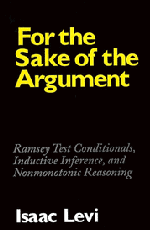 For the Sake of the Argument
For the Sake of the Argument Book contents
- Frontmatter
- Contents
- Preface
- For the Sake of the Argument
- 1 Introduction
- 2 Unextended Ramsey Tests
- 3 Modality without Modal Ontology
- 4 Aspects of Conditional Logic
- 5 Nonmonotonicity in Belief Change and Suppositional Reasoning
- 6 Inductive Expansion
- 7 Defaults
- 8 Matters of Degree
- 9 Normality and Expectation
- 10 Agents and Automata
- Notes
- Bibliography
- Name Index
- Subject Index
10 - Agents and Automata
Published online by Cambridge University Press: 04 May 2010
- Frontmatter
- Contents
- Preface
- For the Sake of the Argument
- 1 Introduction
- 2 Unextended Ramsey Tests
- 3 Modality without Modal Ontology
- 4 Aspects of Conditional Logic
- 5 Nonmonotonicity in Belief Change and Suppositional Reasoning
- 6 Inductive Expansion
- 7 Defaults
- 8 Matters of Degree
- 9 Normality and Expectation
- 10 Agents and Automata
- Notes
- Bibliography
- Name Index
- Subject Index
Summary
Rational agents and inquirers are sometimes capable of evaluating their beliefs, values, and actions with respect to their coherence or consistency – that is, with respect to prescriptive standards of rationality. But this is not always so. Often the predicaments faced are too complex or the time available before a judgment is to be made too short or the cost of deliberation too great for even the most intelligent and well balanced agents to engage in such self-criticism. And even when these considerations present no obstacle, emotional difficulties and indolence may impede this type of activity.
Because agents sometimes can and sometimes cannot fulfill the demands of reason by themselves, they need help. Education in logic and mathematics can contribute. Practical training in various types of deliberation is often useful. Whether current forms of psychotherapy are of value is a matter of dispute but their chief importance to us is their claim or promise to do so. The same is true of reading good literature.
We also use prosthetic devices when they become available. We write notes to ourselves when we don't trust our memories. We consult handbooks as stores of information and resources for how to make exact or approximate calculations. And more recently we have become fond of using the products of the burgeoning technologies that furnish us with calculators and other automata that enhance our capacity to engage in self-criticism.
I make these banal observations to emphasize a simple but important point.
- Type
- Chapter
- Information
- For the Sake of the ArgumentRamsey Test Conditionals, Inductive Inference and Nonmonotonic Reasoning, pp. 289 - 291Publisher: Cambridge University PressPrint publication year: 1996
